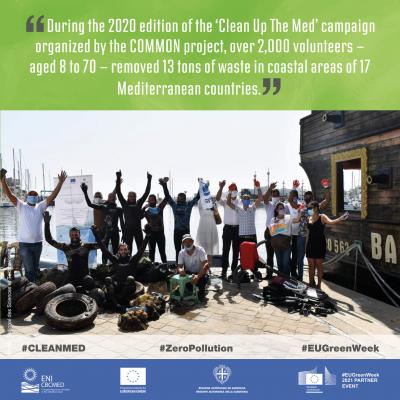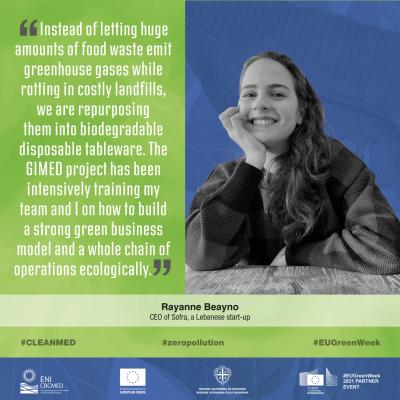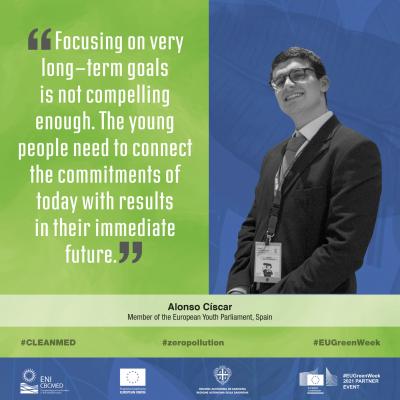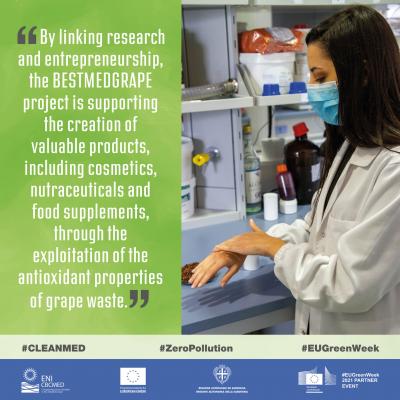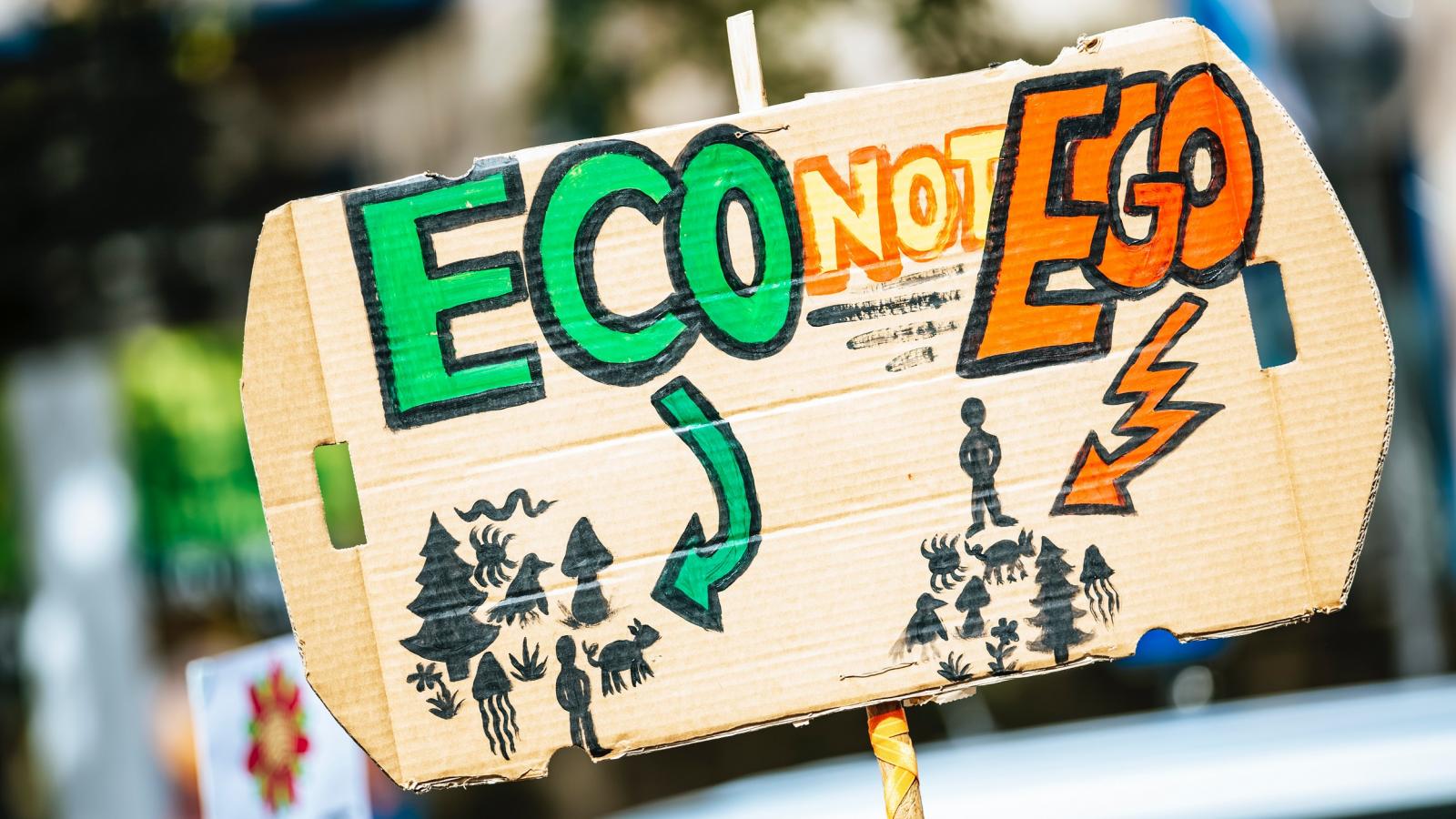دعونا نكون جميعا جزءا من الحل: كل جهد هو مهم للحد من التلوث في البحر الأبيض المتوسط
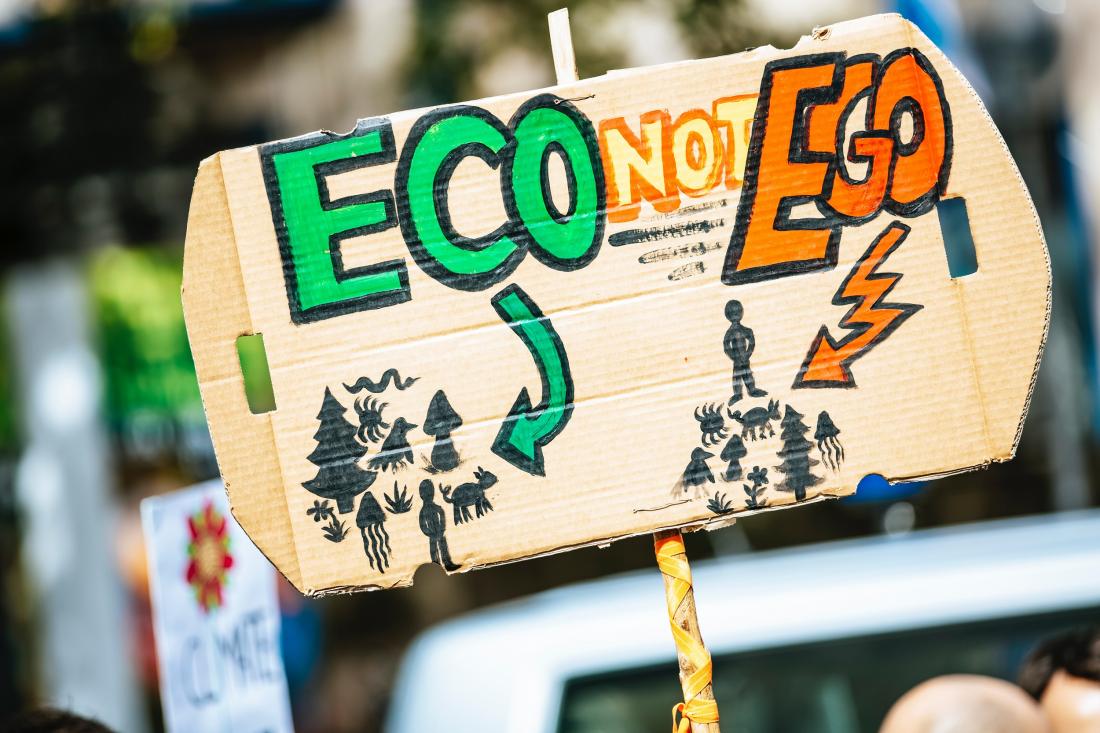
المحتوى متاح باللغة الإنجليزية
Within the framework of the EU Green Week, Europe's biggest annual conference on environment policy, the ENI CBC Med Programme organised on 1st of June the CLEANMED event under the title "Young people for zero pollution in the Mediterranean". The discussion featured a diverse range of sessions to connect with young Mediterranean environmental activists, witness tangible actions on the ground, gather participants inputs and think of how we can reduce pollution together in the region.
From environmental adventurers travelling in kayak to collect waste to scientific researchers studying the level of microplastics ingestion in marine commercial species, every action counts to make the Mediterranean a better and healthier place to live in.
Over 150 participants from 21 countries took part in our green journey throughout the Mediterranean, a major a hotspot for climate change and biodiversity.
Read the full story.
Beating inactivism: delivering on individual, community and political level to face the consequences of climate change
He is from Italy and she is from Lebanon. They both share the Mediterranean Sea, climate activism and the belief that every single action towards the planet matters. Giovanni Mori is the spokesperson of Fridays for Future in Italy. Nouhad Awwad is a Greenpeace campaigner and nature's adovcate. While Nouhad believes that we still need to raise awareness in the MENA region (Middle East and North Africa) regarding the consequences of climate change on environmental but also health and social level, Giovanni thinks that we already know what we need to take a step further and act. They both agree that action is needed at individual, community and political level.
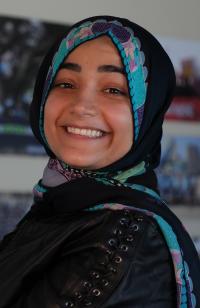
We need to act. Be aware of your energy and water consumption. Be informed to negotiate with your representatives and put pressure on them.
At individual level, they ask to reduce waste generation and stop using single-use plastic products and show decision-makers that we value our environment and we need more protected areas and nature conservation. At community level, we can change habits and move towards soft mobility (i.e., cycling) or share resources (i.e., carpooling), spread the word by all means: lectures in schools, podcasts, etc. At political level, we need to engage with our representatives, so they develop the adequate tools (i.e. laws) to protect the environement and apply them.
Once you act on individual, community and national level, then, you can move to a a broader regional and international level. We are all facing the disaster of climate change and pollution, so we all need to connect and work together to save this hotspot that is the Mediterranean.
If solutions are applied, 99% of the people will live in a much less polluted environment. Just start yourself and then activate all the people around you. You never know you are going to inspire the next Greta Thunberg.
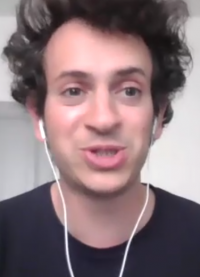
Navigating the Mediterranean Sea to raise awareness about pollution
Moving to action, we connected with Annaëlle Marot and Solène Chevreuil, two French environmental activists who are using adventure as a means to raise awareness about (sea) pollution. They are currently undergoing a 2-month field trip rowing and cycling to clean up rivers and the Mediterranean coast by organising waste collection every Sunday on their route. From their kayak, they connected live to share their experience explaining that the power of such a project is the encounters they make. Whenever they stop in a place, people listen to them because they are on the field doing something concrete. They are fully aware that waste collection is not enough, but it is complementary to climate legislation, lobbying and scientific research.
This simple action enables them to reach people who are less concerned about climate change and get them involved. They quote the previous speakers saying that what is important is to do something at each one’s scale and connect to each other.
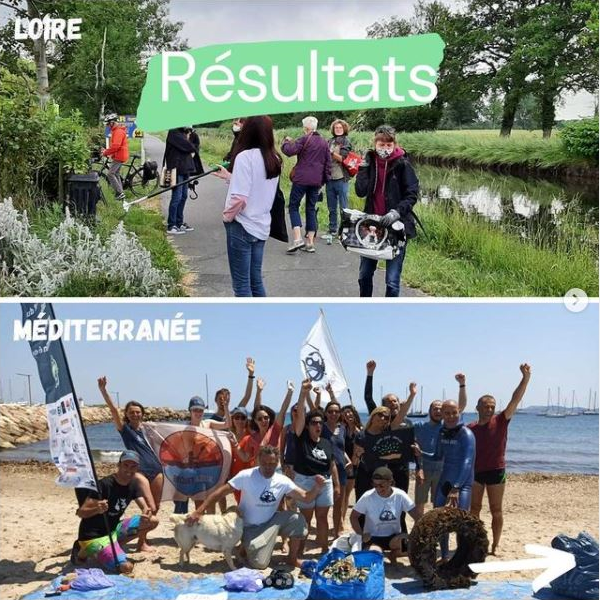
They invite all the participants to join their group of eco-adventurers and take part in future expedition under “Projet Azur”. They would also be happy to see some of them in one of their waste collection days in the coming weeks in south of France and Catalonia.
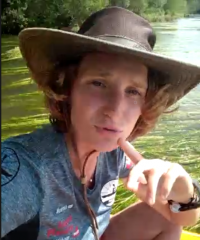
It is not our rubbish, but it is our planet.
Turning waste into a valuable solution in a place where the environment is not a priority
Majd Al Mashharawi from Palestine, gave us a very detailed speech on the reality she lives in Gaza and how she successfully set up two environmental-friendly businesses within the last five years providing real solutions to construction waste and electricity supply.
From a place where you cannot import material to construct homes, she managed to build a light yet solid brick from rubbles and ashes rehousing up to 35,000 people. That's how GreenCake was born. But then, she had to face other obstacles: how could she produce these blocks with only 3 to 6 hours of unreliable electricity per day? That’s how she came up with a sustainable, clean solution: provide affordable solar energy. Her second company was born: SunBox which has delivered so far clean electricity to 65,000 people.
The story does not end here. She has to face the 45% taxes on the components of the solar solution, get the different permits to import and ship these components and face local competitors who offer cheap but very polluting batteries for home generators.
To go a step further, she started a research to identify the dumps of illegal recycling batteries which employ 15 years-old teenagers and its effects on people´s health.
We have to adapt to the situation, many families have no access to building material. We were able to rebuild some many houses.
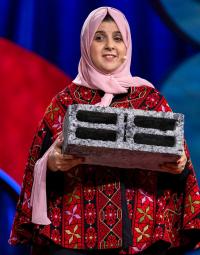
To sum-up, in a place where unemployment rate reaches up to 70 %, Majd Al Mashharawi offers solutions from the community to the community, creating jobs and training university students on environmental issues. By tackling environmental issues, she also contributes to the development of the local economy while addressing important health issues.
Cleaning up our country, contributing to the circular economy and creating jobs
Lebanon witnessed a big waste crisis during the summer of 2015. Georges Bitar was back home on holidays. He then decided to stay in Lebanon and take action. He realised that people did not know how to recycle and what to do with their waste. He developed an application that explains how to recycle and offers a free of charge service to collect recyclable waste directly at home. Within half an hour, a person comes and picks up the waste and transports it to different sorting centres. This is how Live Love Recycle was created. 6 years later marked by an economic, health and social crisis peaked with the explosion of the port of Beirut which destroyed large parts of the city including the NGO premises, Georges Bitar managed not only to overcome these problems but also to expand the service to two other cities in Lebanon, creating 50 decent jobs.
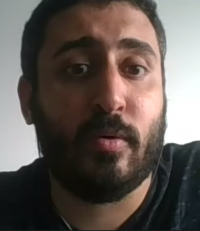
Since the NGO exists, a community of 30,000 people have been recycling in Lebanon and they gathered over 6 tons of waste which would have either been dumped in landfills or directly ended in the sea.
When you find waste from Lebanon on the Greek and French coast, you realise how big is the problem. Georges does not pretend to have the unique solution. It is a great one among others. If each one of us starts reducing its waste and recycle, there would be a huge impact on our planet. This is badly needed when you know that even in the most advanced countries in the EU in terms of waste management, only 43 % of waste is being recycled.
Georges made a call to encourage people in Lebanon to download the Live Love Recycle app and use it. His NGO is also ready to expand to other countries. Finally, he invited Annaëlle and Solène to visit Lebanon one day if their kayaks bring them there.
Closing the loop of organic waste: a success story from Catalonia, Spain
We connected live with two ENI CBC Med-funded projects to see on the ground how EU money is being used to innovate in waste management and monitoring marine litter.
We first connected with DECOST project team. From Les Masies de Roda, a town of 700 inhabitants north of Barcelona. Joan, Mabel and Albert (BETA Technological Center) explained the three steps of the pilot they are implementing to recycle 100 % of the organic waste of the town. Citizens go and throw their organic waste in one of the new composters installed. After three months of decomposition in a plant, citizens can come and pick up free of charge bags of compost for their garden. It is easy and effective. The DECOST team is very proud to have enhanced organic waste management, otherwise it would have ended in landfills.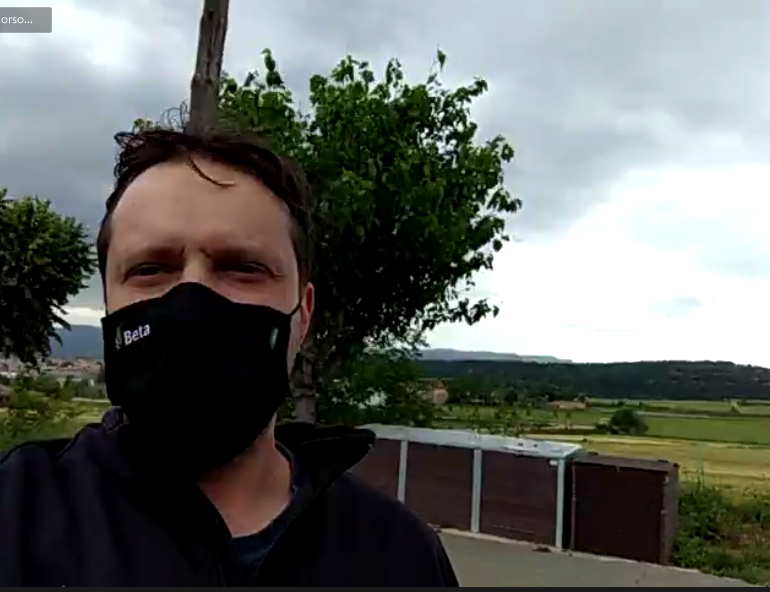
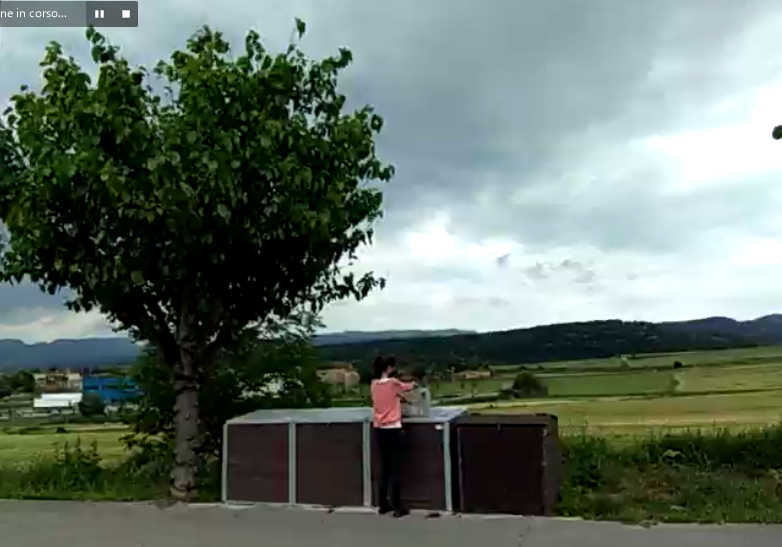
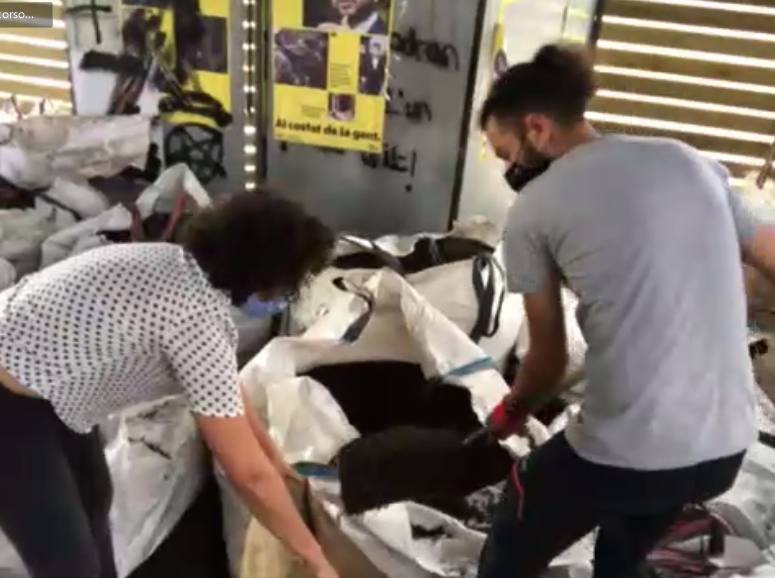
Mediterranean researchers investigate the health effects from microplastics in commercial fishes
Our green journey took us to the laboratory of Professor Mohamed Bani at the Sousse University in Tunisia. The Professor of toxicology showed us the different units of his laboratory in which, together with his team, he identifies and characterises plastic particles in two fish species we eat: bream and sardine. They chose these species for its economic interest, but also because there are widespread in Lebanon and Italy, two partners countries of the COMMON project in the framework of which this research is being done.
From the metagenomic unit to transcriptomic, Prof. Bani explained in a very clear way how they can detect plastic particles in these species and analyse if these plastic particles could be a vector of disease to human beings. With time, patience and passion, he and his team advance scientific research for the benefit of all and raise awareness about the danger of plastic particles.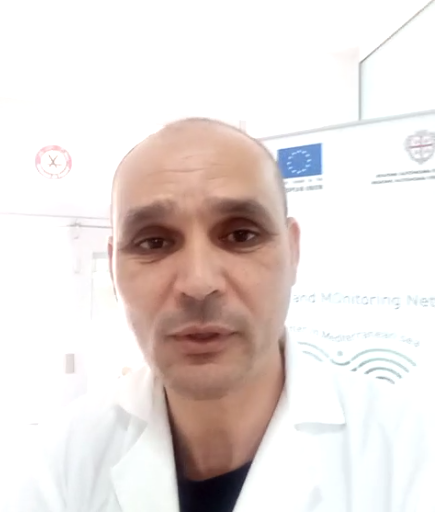
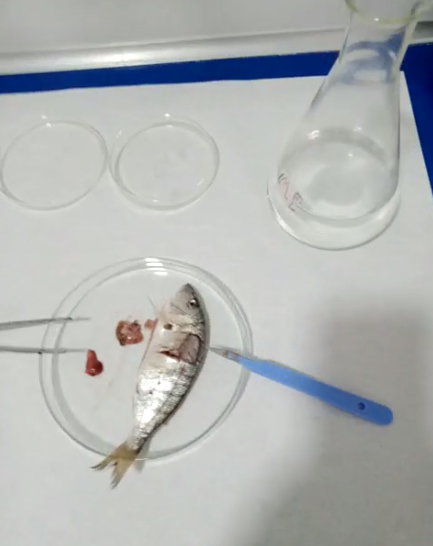
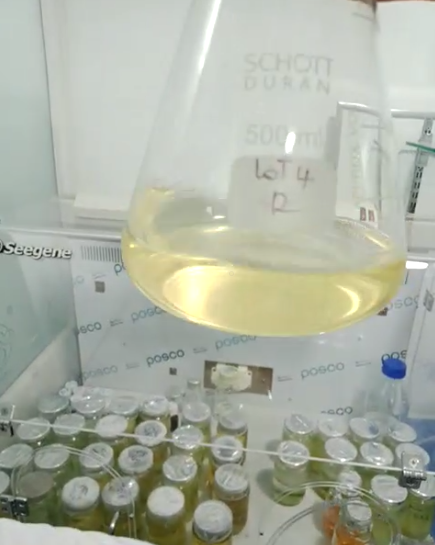
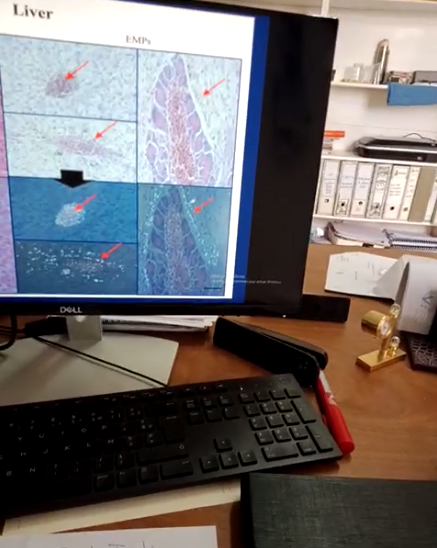
Let’s be part of the solution: brainstorming on plastic waste and biowaste management
Staying in Tunisia but moving to another session - the ‘ideathon’ - two case studies were presented so that participants can brainstorm and come up with some ideas. We first listened to Ms. Khouloud Charfi from World Wildlife Fund (WWF) North Africa who presented a specific case of plastic pollution in the Kerkennah Archipelago focusing on plastic fish trap, abandoned fishing nets in the sea and waste dumping from inhabitants and tourists.
Among the proposals gathered from the participants, we can mention the use of alternative materials for fish trap (rush, metal, bioplastic), raise awareness through diving activities to collect plastic fish nets, incentives to fishermen to stop using plastic nets, turn fish nets into new products (handcrafts), organise hackathon to upcycle plastic nets and finally work with locals and tourist to use less packaging.
The second case study dealt with local biowaste management and what prevents citizens from accepting the composting at municipal level. Mr. Ramon Plana, an expert in waste management from Spain, explained the case of how to introduce community composting in a small town in north of Spain.
Combining his experience and inputs from participants, we realised that there is more probability of success when a bottom-up approach is applied, asking citizens to be part of the solution. When it comes to convince people to get engaged, the key words are: explain and listen. First, the solution provider has to explain that composting won’t imply a huge effort, won’t bring flies, won’t produce odours, may bring benefits that can be invested in creating local jobs. Then, it’s important to listen to people’s reluctance, to understand them and find a solution that fits their expectations. In this matter, what counts most is to think of common benefits and not individual ones.
Learning by playing!
Following the ideathon, we played a 10-question quiz about pollution in the Mediterranean and the winner was Mr. Larbi Ben Tili, from Marsa in Tunisia and who works for the MED-InA project.
From local to global, how to scale up and make our voice heard to save the Mediterranean
To wrap up the event, Ms. Rim Filali Meknassi from the Union for the Mediterranean (UfM) focused on four main ideas:
- First, as the level of awareness about climate change is different in the Mediterranean area, we must address inequal access to information;
- Second, once we have this knowledge, it is time to act and every single action counts;
- Third, we have to create synergies between awareness and action on the ground. By doing this, we create a multiplier effect that can leverage these actions and take them to the next level.
- Fourth, it is crucial to scale up local and pilot initiatives and there the UfM can intervene by bringing these experiences to the attention of policy-makers.
Today, we are using three times more the natural resources than what the Mediterranean region can provide.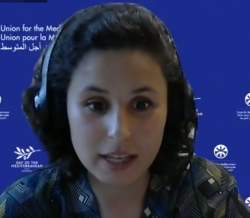
For instance, the UfM is working to build a common Mediterranean voice at the next United Nations Climate Change Conference (COP26). In October 2021, the UfM should approve its 2030 Greener Med Agenda which sets out a collaborative basis for joint solutions to accelerate the transition towards a green, circular and inclusive economy, with biodiversity at the centre.
We hope you enjoyed our green journey and that will take action now to protect the future of our Mediterranean region!